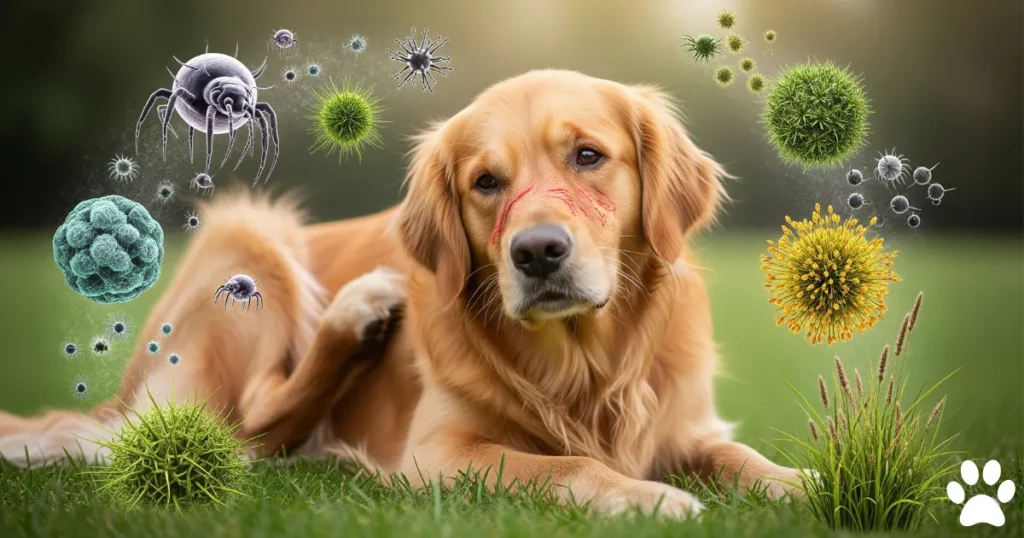Can dogs have allergies? Yes, they can – just like people, dogs can develop allergic reactions to various substances in the environment, foods, or even their own skin. While it may surprise some pet owners, allergies in dogs are not uncommon and can significantly impact a dog’s quality of life if not treated properly. Allergies occur when a dog’s immune system overreacts to something normally harmless, like pollen, certain foods, or flea bites. These triggers are called allergens, and when your dog is exposed to them, the immune system treats them as invaders, causing itching, swelling, or even digestive issues. It’s critical to understand the difference between an intolerance and a real allergies. An allergy is an immune response – it can cause skin problems, itching, inflammation, or gastrointestinal upset. However, the immune system is unaffected by dietary intolerances, such as lactose intolerance. It doesn’t cause irritation or inflammation, but it might produce bloating or an upset stomach. This distinction is critical because it determines how to treat the problem.
How do Golden Retrievers fit into this picture? Unfortunately, Golden Retrievers are more prone to allergies than many other breeds. Their sensitive skin and genetic predisposition make them more susceptible to common allergens, especially environmental factors like pollen, grasses, and dust mites. Their love of nature and water (which can contain allergens and irritants) can also make them more prone to attacks if not handled properly. Identifying symptoms early and understanding their causes is critical to preventing discomfort and long-term Health consequences.
Contents
- 1 Common Allergies in Dogs
- 2 Golden Retriever Allergies: Why This Breed Is More Susceptible
- 3 Signs and Symptoms of Allergies in Dogs
- 4 What to do about allergies in dogs? Diagnosis and testing
- 5 Effective Dog Allergy Relief: Veterinary and Home Remedies:
- 6 Preventative Tips for Avoiding Dog Allergies
- 7 Are Golden Retrievers Hypoallergenic? Myth Busted
- 8 Final Thoughts: How to Help Your Dog Live Allergy-Free
Common Allergies in Dogs
Understanding the different types of allergies for dogs is the first step to keeping your Golden Retriever healthy. Just like people, dogs can develop a variety of allergies that are triggered by different substances and present in different ways.
Food Allergies
A food allergy occurs when your dog’s immune system reacts negatively to certain ingredients in their diet. Common triggers include chicken, beef, dairy, wheat, soy, and eggs. Its symptoms might include gastrointestinal disorders like vomiting or diarrhea, persistent ear infections, and skin conditions including redness and itching. It’s important to note that food allergies often develop over time and may not show up until your dog has been eating the same food for months or even years.

Environmental Allergies
The most prevalent types of allergies for dogs. Dust mites, mold spores, pollen, and even grasses have potential to cause these allergies for dogs. Dogs exposed to these allergens may exhibit seasonal symptoms such as intense itching, sneezing, watery eyes, or licking their paws. Golden retrievers are particularly susceptible due to their thick, double coats, which can trap allergens.

Flea Allergy
This is a very severe allergic reaction. It is not the fleas that are causing this extreme allergic reaction, but rather their saliva. The skin can become extremely red, itchy, and inflamed after just one bite. Dogs may chew or scratch excessively, which can lead to open wounds, scabs, and secondary infections. Year-round use of flea treatments is the best treatment for this type of allergy.

Contact Allergy
This happens when irritants like detergents, shampoo, certain textiles, or even plants like poison ivy come into touch with your dog’s skin. Constrained redness, irritation, or a rash are among the signs and symptoms. Golden Retrievers with sensitive skin may be especially susceptible to contact allergies.

Golden Retriever Allergies: Why This Breed Is More Susceptible
Golden Retrievers are known for their affectionate nature, intelligence, and loyalty, but they are also one of the breeds most prone to dog allergies. Their genetic predisposition and unique physical characteristics make them more susceptible to certain allergens, especially environmental allergens.
Genetic Susceptibility
Golden Retrievers are more susceptible to allergies due to their genetic predisposition. If one or both parents have allergies, there is a good chance that their offspring will inherit the same sensitivity. This genetic link makes it even more important for Golden Retriever owners to watch for early signs of allergies.
Coat Type and Skin Sensitivities
Golden Retrievers have a thick, double coat that can trap dust, mold, mildew, and other environmental allergens. While their beautiful coat is perfect for cold weather, it can also cause skin irritation and chronic infections if not brushed regularly.
Lifestyle and Environment
Golden Retrievers love the outdoors — they frolic in fields, swim in lakes, or roll around in the grass. While this active lifestyle is good for their health, it also increases their exposure to potential allergens. Without proper grooming and bathing, allergens can build up on their skin or coat and cause a reaction.
Signs and Symptoms of Allergies in Dogs
It’s important to recognize the early signs of allergies for dogs so that your Golden Retriever can live a healthy, itch-free life. While symptoms can easily be attributed to fleas or seasonal changes, recurring problems may indicate something deeper, like a severe allergic reaction.
Itchy Skin and Excessive Scratching
Constant chewing, licking, or scratching is one of the most typical symptoms of allergies in dogs. Dogs may focus on particular parts of their bodies, such their tummy, armpits, ears, or paws.. This behavior often results in “hot spots”: red, irritated patches of skin that may crust over or become inflamed.
Chronic Ear Infections
Golden Retrievers are especially prone to ear infections due to their floppy ears and watery skin. If your dog is shaking his head, scratching his ears, or has a foul odor, allergies may be the cause.
Watery Eyes, Sneezing, and Runny Nose
While less common than in humans, breathing problems in dogs can still be a sign of allergies. Sneezing, a runny nose, or red, watery eyes are signs that allergens like dust, pollen, or mold are irritating your dog’s system.
Gastrointestinal Problems
Can dogs have allergies that affect their stomachs? Absolutely. Vomiting, diarrhea, or gas may indicate a reaction to an ingredient in dog food. Skin and stomach issues are known to result from food allergies.
Behavior or Mood Changes
Symptoms caused by allergies can cause noticeable changes in your dog’s behavior. He may seem irritable, lethargic, or less playful. These subtle signs are often overlooked but may indicate chronic allergies.
What to do about allergies in dogs? Diagnosis and testing
Now it’s time to answer the question: “Can dogs have allergies?” The answer is yes, and if your Golden Retriever is still sniffling, sneezing, or has stomach problems, it’s time to take action. Diagnostic tests are essential to ensure your dog is safe and secure.
When to see a vet
Veterinarians are very long-term, but also available later, so they can be used quickly and easily. Consult a veterinarian for medical advice. Vets are very careful, as they are sensitive to parasites, infections, and allergies, and are guided by the passages.

Allergy testing options
There are two common methods of testing for allergies in dogs. Depending on the quality and consistency of the test results, we recommend seeking advice from a vet:
Intradermal Skin Test:
Consider performing the test yourself. This test involves putting on a small patch so we can see the reaction.
Blood test (RAST or ELISA):
These tests look at your dog’s blood for allergy-specific antibodies. They are less invasive, but sometimes less accurate than skin tests.
Keep an allergy diary.
Testing tips are important for documenting your symptoms at home. Note when symptoms occur, when your dog comes in, and any changes in their environment. You should document this for veterinary identification.
Effective Dog Allergy Relief: Veterinary and Home Remedies:
Once you’ve determined that your Golden Retriever has a dog allergy, it’s important to find effective treatments for the symptoms and prevent future outbreaks. Whether your dog’s reactions are caused by food, environmental factors, or flea bites, you have many options, from veterinary treatments to natural home remedies for Allergy Relief.
Veterinary Treatments:
Veterins typically start with prescription medications tailored to your dog’s allergy type. These include:
Antihistamines:
These are popular and safe ways to reduce inflammation and irritation.
Corticosteroids:
These are used for more severe reactions, but are not suitable for long-term use due to side effects.
Immunotherapy (allergy shots):
A long-term solution that works like a vaccination and gradually desensitizes your dog to allergens.
Antibiotics/Yeast:
If allergies have caused secondary skin infections.
Over-the-Counter and Herbal Medicines
If you’re doubting, “Can dogs have allergies that can be managed at home?” the answer is yes, many mild cases can be alleviated with lifestyle changes and gentle remedies:
Omega-3 fatty acids:
Support skin health and reduce inflammation.
Probiotics:
Benefit gut health and help with food allergies.
Colloidal oatmeal bath:
Soothes itchy, irritated skin.
Coconut oil:
Acts as a natural moisturizer and can help with dry patches or minor rashes.
Dietary Changes
Diet elimination from your dog meal plan is perfect solution, if your retriever’s veterinarian suspects a food allergy. This involves feeding your dog a limited ingredient diet or hydrolyzed protein to isolate the allergen. Once the allergen is identified, this can help avoid the trigger in the long term.
Preventative Tips for Avoiding Dog Allergies
Now that we’ve answered the question that can dogs have allergies (yes, absolutely), the next important step is learning how to prevent allergy flare-ups before they happen. For dogs, especially breeds like the Golden Retriever, daily routines and small lifestyle changes can go a long way in controlling symptoms.
Keep Your Home Clean
One of the most effective ways to control allergies for dogs is to minimize exposure to common allergens in your home. Vacuum your carpets and furniture regularly to remove dust mites, pollen, and pet dander. Install air purifiers in your dog’s favorite areas and HEPA filters in your air conditioner.
Keep Your Dog Clean and Groomed
Regular grooming helps remove allergens from your dog’s coat and skin. Bathe your dog with a hypoallergenic or oatmeal shampoo, especially after playing outside. Regularly clean your dog’s paws, ears, and belly, as these are common places for allergens to accumulate.
Monitor Your Dog’s Time Outside
Limit your dog’s time outside during allergy seasons, such as spring and fall, when pollen counts are high. Dry your dog thoroughly after walks to remove allergens, and don’t let him roll in the grass if he’s sensitive to them.
Choose Hypoallergenic Products
Use products labeled “pet-safe” or “hypoallergenic,” from cleaning sprays to laundry detergents and bedding. Dogs can develop contact allergies to common chemicals, so choosing gentle products is critical.
Control Fleas and Parasites Year-Round
A serious allergic reaction might result from only one flea bite. Prevent flea allergy dermatitis by using a year-round flea prevention product recommended by your veterinarian.
Are Golden Retrievers Hypoallergenic? Myth Busted
If you’re thinking about getting a Golden Retriever but suffer from allergies — or if you’re a dog owner wondering, “Can dogs have allergies even if they’re hypoallergenic?” — Then this is for you.
In short, Golden Retrievers are not hypoallergenic. In fact, they’re among the breeds most commonly associated with dog allergies, and can even trigger allergies in humans due to the shedding of fur, dander, and proteins in their saliva. The term “hypoallergenic dog” is often misunderstood. No dog breed is 100% allergen-free. While some breeds shed less and produce fewer allergens, Golden Retrievers shed heavily year-round. Their thick double coat traps pollen, dust, and other irritants, making them more prone to rashes and more prone to allergies in humans.
Furthermore, it is no longer a question of whether dogs can have allergies; it is a fact: Golden Retrievers are sensitive to environmental and food allergens, making them a breed that requires special care. Their care, diet, and home environment must be well balanced to avoid common allergic reactions.
Final Thoughts: How to Help Your Dog Live Allergy-Free
Can dogs have allergies? Absolutely, and Golden Retrievers are especially prone to them. From food allergies to environmental factors like pollen and dust, there are many reasons why your dog may be itchy, sneezing, or have an upset stomach. The good news: With awareness, early intervention, and proper care, your dog can live a happy, healthy life.
Treating dog allergies starts with recognizing the symptoms—itchiness, ear infections, red eyes, or gastrointestinal issues. Once the allergy is diagnosed, it’s important to consult with your veterinarian to determine the specific allergen and begin treatment. Whether you’re switching to a hypoallergenic diet, taking natural supplements, or taking medications, there are many ways to provide relief for your dog. Prevention is also important. A clean environment, regular brushing, and avoiding known triggers can greatly reduce allergic reactions, especially in sensitive breeds like golden retrievers. Remember, your dog is counting on you to recognize the signs and take action. The sooner you take action, the sooner your four-legged friend can wag his tail, scratch his belly, and enjoy fun adventures again. Do you have any experiences with dog allergies? Share them in the comments — we’d love to hear how you helped your dog feel better!
Dr. Nabeel A.
Hi, I’m Dr. Nabeel Akram – a farm management professional by trade and a passionate Golden Retriever enthusiast at heart. With years of experience in animal science and livestock care, I’ve built a career around understanding animals—how they live, thrive, and bring value to our lives. This blog is a personal project born from that same passion, focusing on one of the most loyal and lovable breeds out there: the Golden Retriever. Whether I’m managing farm operations or sharing insights on canine health, behavior, and care, it all ties back to one core belief—animals deserve thoughtful, informed, and compassionate attention. Welcome to a space where professional expertise meets genuine love for dogs.
Facebook |


Links will be automatically removed from comments.